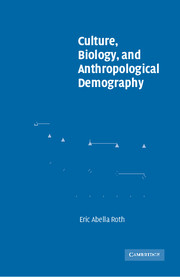Book contents
- Frontmatter
- Contents
- List of Figures
- List of Tables
- Acknowledgments
- 1 Anthropological Demography and Human Evolutionary Ecology
- 2 Reconciling Anthropological Demography and Human Evolutionary Ecology
- 3 Mating Effort and Demographic Strategies
- 4 Demographic Strategies as Parenting Effort
- 5 Future Research Directions
- References Cited
- Index
1 - Anthropological Demography and Human Evolutionary Ecology
Published online by Cambridge University Press: 15 December 2009
- Frontmatter
- Contents
- List of Figures
- List of Tables
- Acknowledgments
- 1 Anthropological Demography and Human Evolutionary Ecology
- 2 Reconciling Anthropological Demography and Human Evolutionary Ecology
- 3 Mating Effort and Demographic Strategies
- 4 Demographic Strategies as Parenting Effort
- 5 Future Research Directions
- References Cited
- Index
Summary
Two Solitudes
With the twenty-twenty vision of hindsight, I can easily identify two events that initiated this book. The first was a 1996 American Anthropological Association (AAA) Invited Session titled “Evolutionary Biology and Human Social Behaviour: 20 Years Later.” Organized by human behavioral ecologists Lee Cronk and Napoleon Chagnon, this two-part session took its name from the AAA session twenty years earlier that culminated in the edited volume, Evolutionary Biology and Human Social Behavior: An Anthropological Perspective (Chagnon and Irons 1979). This work became the flagship for the anthropological application of E. O. Wilson's (1975) thesis of sociobiology. During the 1996 session (now represented in the edited text, Adaptation and Human Behavior: An Anthropological Perspective, by Cronk, Chagnon, and Irons 2000), paper presenters spoke passionately of the importance of evolutionary perspectives in understanding and explaining human behavior, including demographic behavior. They also clearly spoke to the converted; not one member of the audience questioned the speakers' basic assumptions of fitness maximization as the underlying motivation for human behavior.
Presenters emphasized biology, at the expense or even exclusion, of culture. In doing so they echoed past evolutionary ecologists' thoughts on the nonimportance of human culture, exemplified by Wilson's (1978:171) famous statement that “genes hold culture on a leash.” Although contemporary human evolutionary ecologists, today also called human behavioral ecologists, distance themselves from such blatant statements of genetic determinism, they still have little time for culture.
- Type
- Chapter
- Information
- Culture, Biology, and Anthropological Demography , pp. 1 - 42Publisher: Cambridge University PressPrint publication year: 2004

